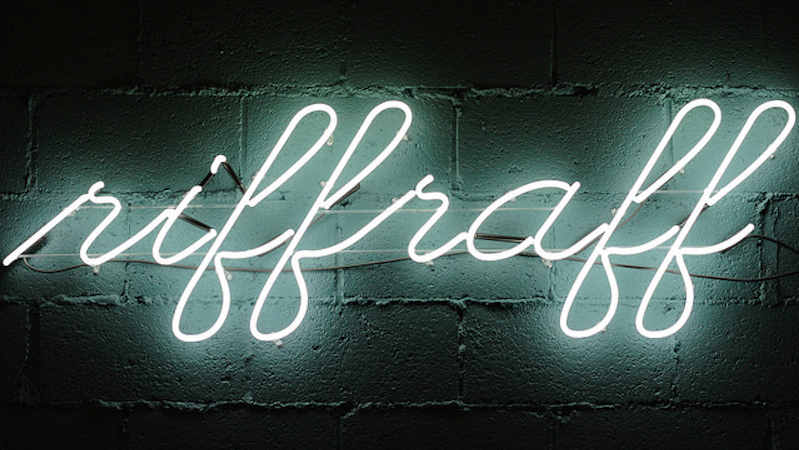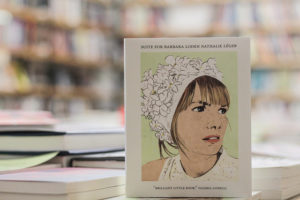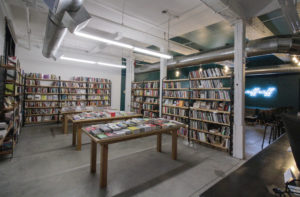
Spring is just around the corner!* And while visions of sugar snaps dance in our heads, something new** is sprouting here in the Book Marks Translation Corner. We’ve got reading round-ups, publisher profiles, and now… Shelf Love, a series that focuses on independent bookstores with their fingers on the pulse of literature in translation.
What better place to start than Riffraff, founded just over a year ago in Providence by Emma Ramadan and Tom Roberge, both of whom were (and are) active members of the literary community. Before leaving New York, Tom worked as an editor at Penguin and a publicist at New Directions, and also slung books and called shots at nerd temples McNally Jackson and Albertine Books. Emma is a stellar translator whose work has appeared more than once in this very column; she studied translation in Paris and was a Fulbright scholar in Morocco, and just recently published a series of essays on translation over at The Quarterly Conversation. I’m in the middle of her translation of Brice Matthieussent’s Revenge of the Translator right now, in fact, and am enjoying it immensely. As if opening and running a bookstore/bar weren’t enough, the dynamic duo has a co-translation of The Boy by Marcus Malte (Restless Books) about to hit the shelves.
Emma and Tom were kind enough to take a moment out of their busy days to answer my questions about the store and the most exciting titles in translation they have on offer. Below, some great recommendations from people who spend lots of time thinking about what other people want to read.
* * *

So! Tell us about Riffraff.
We’re a bookstore and a bar specializing in small press titles, literature in translation, literary fiction, and marginalized voices. We couldn’t find the books we were interested in at the other bookstores in Rhode Island, and we could tell there were other people interested in those books, too, so Providence was the perfect place for us to open Riffraff. I think of us as a bookstore and a bar (as opposed to a bookstore-bar); the bookstore is connected to the bar but there are no tables or chairs in the bookstore, nothing getting in the way from browsing unimpeded. Drink in hand, of course. We also have a full bar (liquor, wine, beer, cider, sake, cocktails, everything). We have customers who come in just for the bookstore, customers who come in just for the bar, customers who come in for both, customers who come in thinking they only want to browse books and stay for a drink, customers who walk right past the books for the bar and end up browsing, every possible combination. We’re very proud of our cocktail menu—we come up with most of the drinks ourselves and we don’t charge very much for them. In the same way that we strive to be as inclusive as possible with the books on our shelves, we keep our drink prices low so that everyone can feel welcome in the bar. In sum, we’re a non-pretentious space for good books and good drinks.
Which titles in translation have been most popular among your customers?
Emma: Anne Garréta’s Sphinx, translated by me (Deep Vellum). This is our #1 best seller in the store, probably because Tom wrote a very cute staff pick about how it’s the reason we met, and therefore really the reason our store exists. It was the first book I ever translated and the one I still think about the most today. A book written without gender identifiers for either of the two main characters, it challenges our perceptions of people based on gender identity, and explores what it means to disregard social constructions around amorous relationships.
Naja Marie Aidt’s Baboon, translated by Denise Newman (Two Lines). I tell every customer to buy this book. It’s one of the most exciting reading experiences I can remember from the last decade. Each of the short stories takes you somewhere you don’t expect. They’re eerie, haunting, horrifying, thrilling. This book is an absolute dark delight.
The Last Wolf & Herman by László Krasznahorkai, translated by John Batki & George Szirtes (New Directions). The two novellas in one edition make for a nice introduction to Krasznahorkai’s writing, but that isn’t to suggest they’re minor; they’re both just as powerful and masterfully crafted as everything he’s written, leaving readers both awed and unsettled.
Such Small Hands by Andrés Barba, translated by Lisa Dillman (Transit Books). This is an easy handsell because the premise — a new arrival at an all-girls orphanage dramatically alters the group’s social fabric—is so immediately intriguing and the writing is so crystalline that we can say “trust us, it’s amazing” with absolute conviction.

And which titles do you push hardest?
Emma: We push Paradise Rot by Jenny Hval, translated from Norwegian by Marjam Idriss and published by Verso, to nearly everyone who asks for a recommendation. It was my favorite book I read last year, and Tom’s too. It completely sucks you into the world of one woman, her roommate, and their home, slowly morphing around them in a way that’s not quite sinister, but not quite innocent either.
I push Marie NDiaye on everyone (Two Lines has published a few of her books, translated by Jordan Stump). There’s no one else who writes like her. The way she gets at exploring the inner thoughts and emotions of women, but in a haunting, surreal way. Her books are always surprising, and yet reveal things that are utterly familiar about us all. I recommend Self-Portrait in Green and All My Friends in particular.
Clarice Lispector in her various translations. Água Viva (New Directions, translated by Stefan Tobler) is where I started with Lispector’s work, and where I suggest our customers start, too. It’s a brief and accessible (as far as she goes) introduction to the way her brain works, the jolts of genius she lets loose on the page in a sort of stream of consciousness that goes nowhere but takes you everywhere.
Nathalie Léger’s Suite for Barbara Loden (Dorothy, a publishing project, translated by Natasha Lehrer and Cécile Menon)—Is there anything better than a book about a woman obsessing over another woman and her work? What started out as an Encyclopedia entry spins out into a sprawling and fascinating love letter. It’s a quiet and startling book.
Tom: I tend to field all of the queries for books in the broad category of noir, and so if I get a sense that they’ve read the best stuff in English, I like to recommend Jean-Patrick Manchette, an incredibly brilliant French noir writer who managed to pack his books with a great deal of social satire. For those looking for true antiheroes, try Fatale (NYRB Classics, translated by Donald Nicholson-Smith). For something in the vein of Westlake’s The Hunter, maybe Three to Kill (City Lights, also translated by Donald Nicholson-Smith).
Another favorite is Valeria Luiselli’s first novel, Faces in the Crowd, translated by Christina MacSweeney (Coffee House Press). I love the fragmented nature of her writing, and the way she ties it all together into this wonderful sort of gigantic mural in which every detail deserves close examination, but the larger picture is stunning, too.

Tell me about that café-bar.
We’re much more of a bar than we are a coffee shop. We do get students and others who come in to do work during the day, but we’re much livelier at night. Our bartenders rule and a few of them have started working in the bookstore as well. We have literary events almost every week, and a boozy book club once a month. Having the bar makes the space much more of a community hub, a place to meet and engage with others, and having a diverse and inclusive array of books makes it feel like a warm and welcoming environment in which to do so.
Which new or forthcoming translations are you most excited about?
Tom: Tentacle by Rita Indiana, translated by Achy Obejas (And Other Stories). This is real-deal sci-fi mixed with highly literary themes and style, and it’s fantastic, opening the doors to a world of eco-time-travel, voodoo, crumbling empire, drugs, and so much more.
Atlas Inutilus by Hervé Le Tellier, translated by Cole Swensen (Black Square Editions). Prose poetry by a master of playful language and ideas, in a translation that’s just as playful and whip-smart. Impossible to explain the thread running throughout, or maybe I haven’t figured it out yet, but they stick with you, that’s for sure.
Berta Isla by Javier Marias, translated by Margaret Jull Costa (Knopf). A quasi-return to the world he built in the Your Face Tomorrow trilogy, which is all the description any fans of his will need.
Walking, One Step at a Time by Erling Kagge, translated by Becky Crook (Pantheon, April) The English follow up to Silence in the Age of Noise, this book turns Kagge’s explorer-philosopher’s eye to the meaning buried in the simple act of placing one foot in front of the other, over and over again.
Emma: All My Goodbyes by Mariana Dimópulos, translated from the Spanish by Alice Whitmore (Transit Books). A nonlinear exploration of one woman’s constant attempts to flee her past, and the specific moments that will go on to impact her future. Just gorgeous.
My Father was a Man on Land and a Whale in the Water by Michelle Steinbeck, translated from German by Jen Calleja (Darf Publishers). This book is like Alice in Wonderland on a bad acid trip. It’s not for the faint of heart, but it’s always refreshing to read a translation that has nothing to do with war, tragedy, or heartbreak.
Away, Away! by Jana Beňová, translated by Janet Livingstone (Two Dollar Radio). Beňová heeds by none of the rules of writing. Ostensibly about a woman leaving her husband, this book is boundless. Like Água Viva with a plot, or a more fanciful Sarah Manguso. The way the author plays with formatting and text on the page is a total thrill.
Bright by Duanwad Pimwana (Two Lines, April) and Arid Dreams by Duanwad Pimwana (Feminist Press, April), both translated from Thai by Mui Poopoksakul. Mui is one of the few bringing Thai literature into English, and she’s been busy the past year. Duanwad Pimwana is Thailand’s preeminent contemporary woman writer, and will be the first female Thai writer translated into English.
To Leave with the Reindeer by Olivia Rosenthal, translated from French by Sophie Lewis (And Other Stories, April). An exploration of the connection between humans and animals, between freedom and domestication, addressed straight to “you.”
Flowers of Mold & Other Stories by Seong-Nan Ha, translated from Korean by Janet Hong (Open Letter, April). I have a feeling these ten “captivating, unnerving” stories are going to cut deep much like Aidt’s Baboon, but with a tinge of the surreal. Described as David Lynche-esque by Kirkus, I can’t wait to dip into this one.
The Sun on My Head by Geovani Martins (FSG, June). This book, translated from the Portuguese by our own Riffraff bookseller Julia Sanches, is the debut story collection by Brazil’s 27-year old bestselling literary sensation.
Tom and I also co-translated a book coming out this month (March) with Restless Books called The Boy by Marcus Malte. Shameless plug alert. It’s a stunningly beautiful book on the sentence level and utterly unique on the plot level and we can’t wait to have something we both worked so hard on at the store.
And what about events? What’s up next?
The Summer of Dead Birds by Ali Liebegott (Feminist Press) on April 3
Spain by Caren Beilin (Rescue Press) on April 17
Loudermilk: Or, The Real Poet; Or, The Origin of the World by Lucy Ives (Soft Skull) on May 8
Bunny by Mona Awad (Penguin Random House) on June 11 (this date might change…)
What’s the most surprising thing that’s happened in the store?
Emma: A few weeks ago on a Sunday afternoon, one of our employees texted me to say that the mayor of Providence was sitting at a table at Riffraff having a coffee and reading a book. So I guess we’ve made it?
How long do you think it would take you to notice if I secretly moved in to Riffraff’s basement and came out only at night, like Corduroy the Bear? Hypothetically.
Much like the Alamo in Pee-Wee Herman’s Big Adventure, you’ll be disappointed to discover we don’t have a basement, but our storage room is overflowing with galleys and cookies and you’re welcome any time.
—
* I am not in a position to guarantee any such thing. Also, only in the Northern Hemisphere.
** New to BookMarks, that is; in fact, the title for this column is an homage to something we did over at Buenos Aires Review.
—
All Photographs courtesy of Riffraff
—
Previous entries in this series

